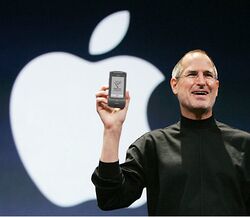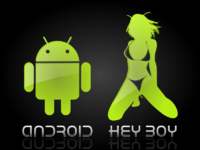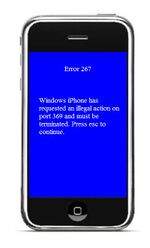Smartphone
A smartphone is a supposedly smarter version of a traditional cellphone. Contrary to popular misconception, it does not make its user any smarter, just more likely to die of brain cancer. Almost everybody in the developed world now owns a smartphone, except for most old people, the Amish, the paranoid and the poor. They were invented as a way to facilitate additional profits for manufacturers through accelerated planned obsolescence, to the delight of people who absolutely have to have the latest gadgets regardless of cost. This is most evident in the iPhone, the most successful smartphone of all time, which Apple Inc. uses to enslave approximately 98% of the population (the rest being too poor and doomed to suffer with cheap Android phones).
Smartphones are also successful for their wide variety of capabilities. They can be used to browse Uncyclopedia, play Angry Birds, check Facebook, take inappropriate pictures, look at inappropriate pictures, and run up enormous bills when the data cap is exceeded. Newer models incorporate even more advanced features, such as making it easier to spend money freely at NFC terminals, wireless charging, working with a smartwatch, and reporting your every move to the NSA using GPS tracking.
A secret feature hidden in almost every smartphone is the ability to make phone calls.
General characteristics[edit]
Touchscreen[edit]
Smartphones usually include a touchscreen of some sort, because if flying cars still have not gotten widespread adoption in the 21st century, then at least we should have moved on from antiquated technologies like physical buttons and keyboards. The touchscreen also makes it easier to butt-dial 911 in case of emergencies. The screen acts as a magnet for dust and fingerprints, to help keep the rest of one's house just a little bit cleaner.
Battery[edit]
Smartphones also come equipped with a rechargeable lithium battery, making them indispensable for times when you need an improvised hand grenade. Modern smartphone batteries are engineered to last longer, and can maintain a charge for either a couple millenia or until you need to make an important call, whichever comes first. After the battery runs out, fun alternatives to recharging it include throwing the phone at people or smashing it with a mallet.
Some recent smartphone models incorporate wireless charging as an option. A full charge can be obtained on these phones by leaving them in a microwave oven for as little as 30 seconds on High.
Apps[edit]
All smartphones can expand their software capabilities by letting users download programs called apps from some sort of app store, whcih are usually designed to be addictive. Most apps allow the user to change their ringtone or turn the flashlight feature on or off, while displaying at least 3 ads after every tap. Some more advanced ones let the user turn their phone into an expensive fart machine soundboard, costing only $0.99 or showing the user even more free ads.
Operating systems[edit]
iOS[edit]

Main article: iPhone
The iOS operating system is only used on Apple's iPhone brand of smartphones. It only allows a user to run one app at a time, because anything more than that would just be confusing. Like anything made by Apple, it is the gold standard and has a perfect design by definition. iOS was designed, programmed, and powered entirely by the late Steve Jobs, and has steadily declined in quality since his departure. More people now run iOS than the former monopolistic operating system, Windows. iOS will also eventually become the replacement interface for all Mac computers, where it will finally bring a successful smartphone interface to desktop users where others have failed.
Android[edit]
Main article: Android (operating system)
Android is made by Google and comes on almost every other smartphone. Anyone who is too poor to get an iPhone usually gets an Android phone instead, singling themselves out for ridicule. Android is powered by Java, meaning it could disappear at any time Oracle feels like it. Android makes it possible for Google to collect even finer details of users' everyday lives for sharing with the NSA. A key feature of Android is that every phone which runs it has a completely different interface and set of preinstalled bloatware, giving users a wide variety of choices and making them more reliant on tech support instead of friends if they ever need help.
Others[edit]
99.9% of all smartphones run either iOS or Android, although some hipsters insist on using something different. These other operating systems will never gain any traction, but each has its own set of diehard fanatics who believe in their respective software cults.
Windows Phone[edit]
Windows Phone allows users to enjoy Microsoft spyware and the Blue Screen of Death no matter where they go away from their desktops. Key features include the ability to edit Word documents or Excel spreadsheets on your phone, and making Bill Gates even richer.
Ubuntu Touch[edit]
Ubuntu Touch is the mobile version of the Ubuntu operating system, so Linux nerds never have to leave their open-source software behind when on the go. It finally lets users use the smartphone interface known as "Unity" with a touchscreen, where it still sucks. The main feature of Ubuntu Touch is a terminal app which brings cutting-edge 1980s tech into your pocket.
Firefox OS[edit]
Firefox is now also a smartphone OS, in much the same way Chrome OS is a desktop OS. Both include only a browser, because their creators were too lazy to implement anything else.
Sailfish OS[edit]
Sailfish OS is just Android with a different interface, renamed because the creators felt they made revolutionary changes. Sailfish OS is based on the failed MeeGo project.
Tizen[edit]
A smartphone operating system made in the People's Republic of China. Aside from the inclusion of Chinese spyware, it is unremarkable vaporware.
Palm OS[edit]
A PDA and smartphone operating system that was used in Palm PDA and Palm Treo phones, which were used by caveman mainly to take notes.



